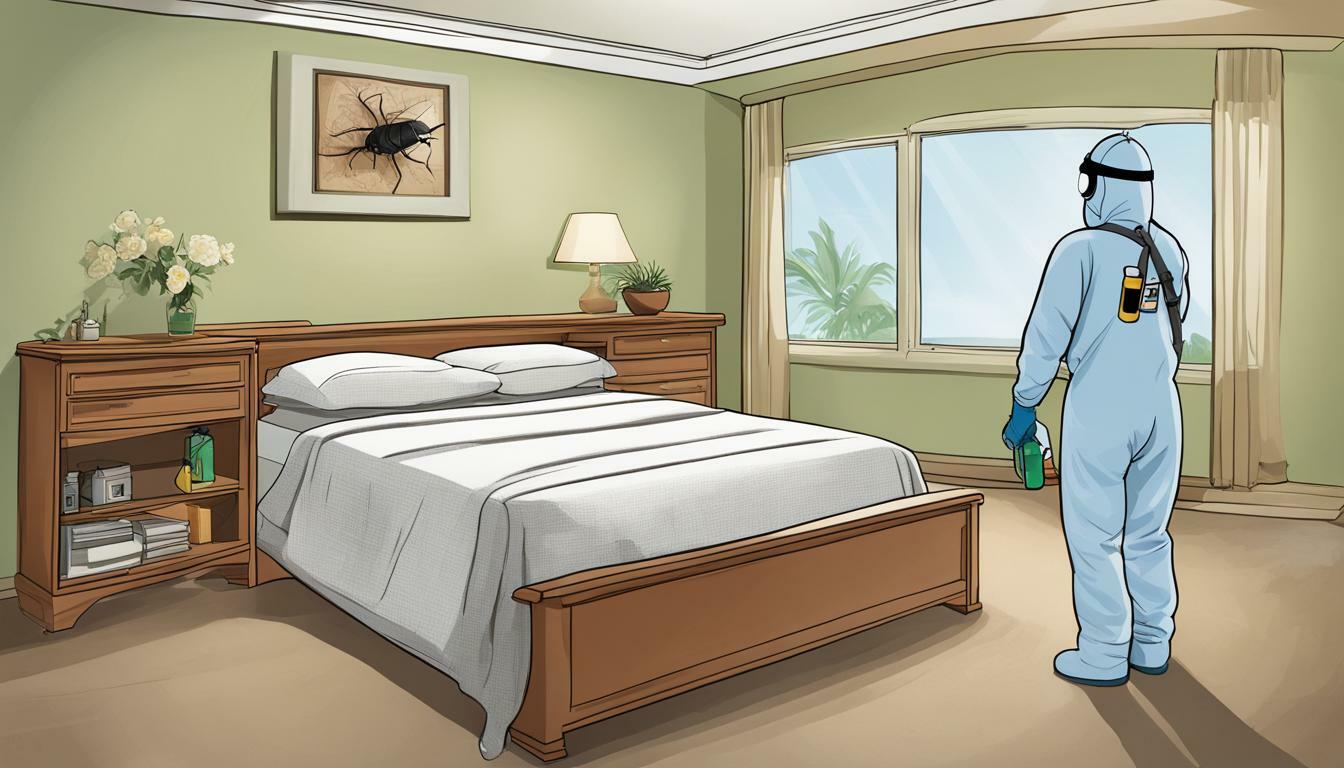
As a professional copywriting journalist, I often receive questions about pest control and how to keep homes safe from unwanted visitors. One question that frequently pops up is, “does pest control spray in bedrooms?”
It is important to understand the potential risks of pest infestations in bedrooms and the safe practices for pest control. In this article, we will explore various strategies for pest control in bedrooms and provide tips for preventing infestations.
Key Takeaways:
- Pest control is essential for maintaining a healthy and safe home environment.
- There are safe practices for pest control in bedrooms that should be followed to minimize potential risks.
- Preventing pest infestations in bedrooms is essential, and can be achieved through cleanliness and sealing any cracks or openings.
Understanding Pest Control in Bedrooms
When it comes to pest control, it’s important not to overlook the bedroom. Without proper pest control measures, bedrooms can become a breeding ground for a variety of pests, including bed bugs, ants, spiders, and even rodents. Not only can these pests cause physical damage to the bedroom, but they can also pose health risks to residents.
Infestations in the bedroom can be caused by a variety of factors, including poor sanitation, clutter, and cracks or gaps in walls or flooring. Pests can also enter the bedroom through windows or doors, especially if they are not properly sealed.
The first step in effective pest control in bedrooms is identifying the type of pest and the severity of the infestation. This can be accomplished through a thorough inspection by a pest control professional or through the use of DIY pest control methods.
Common pests found in bedrooms include bed bugs, which are small, reddish-brown insects that feed on human blood and can cause itchy, red welts on the skin. Ants, spiders, and rodents can also invade the bedroom, often seeking sources of food and water.
To prevent infestations in the bedroom, it’s important to keep the space clean and clutter-free. Regular vacuuming and dusting can help eliminate potential food sources for pests, while sealing cracks and gaps in walls and flooring can prevent them from entering the space in the first place.
Safe Pest Control Practices in Bedrooms
Ensuring safe pest control in bedrooms is of utmost importance to protect the health and well-being of individuals. When dealing with pests such as bed bugs, rodents, or cockroaches, it is crucial to follow safe practices to avoid the harmful effects of chemicals and prevent the spread of infestations.
Here are some safe pest control practices to implement in bedrooms:
Use Non-Toxic Chemicals
When using pest control sprays or powders, it is advisable to choose non-toxic options to minimize exposure to harmful chemicals. Natural and organic products are increasingly available in the market and can be effective in controlling pests. Always read product labels carefully and follow the instructions provided to ensure safe usage.
Prevention Methods
Preventive measures are the best way to keep pests at bay. Regular cleaning, vacuuming, and dusting of bedrooms can make a significant impact in preventing infestations. Additionally, sealing cracks and gaps in walls, floors, and windows can prevent pests from entering the bedroom.
Avoid Overuse of Chemicals
Overuse of chemicals can lead to toxic exposure and health hazards. Therefore, it is essential to avoid using more than the recommended amount of pest control products. It is also advisable to avoid using chemicals when not necessary and consider alternative options such as traps or home remedies for minor pest problems.
Implementing these safe pest control practices in bedrooms can go a long way in ensuring the overall safety and well-being of individuals.
Hiring Professional Pest Control Services
When it comes to pest control in bedrooms, hiring a professional service is often the best choice. These experts have the knowledge, experience, and tools necessary to safely and effectively eliminate infestations.
One of the benefits of hiring professional pest control services is the thorough inspection they perform. They can identify the specific type of pest that is causing the problem and determine the extent of the infestation. This allows them to create a tailored treatment plan that targets the problem at its source.
Professional pest control services also use safe and effective chemicals that are specifically designed for pest control. This means that they are better equipped to handle the chemicals and ensure that they are used in a way that is safe for everyone in the household.
In addition, professional pest control services can provide ongoing maintenance to prevent future infestations. They can identify potential problem areas and recommend preventative measures to keep pests out of your bedrooms for good.
Overall, hiring a professional pest control service is the most efficient and effective way to eliminate pest infestations in your bedrooms.
DIY Pest Control in Bedrooms
While hiring professional pest control services is the recommended approach for serious infestations, some homeowners may prefer a do-it-yourself solution for smaller bedroom pest problems. Here are some home remedies and traps that can help:
- Vinegar: Vinegar is an effective natural cleaner and repellant for pests. Wipe down surfaces in your bedroom with a mixture of vinegar and water to deter pests from nesting.
- Peppermint oil: Peppermint oil has a strong scent that can also repel pests. Dab a few drops on cotton balls and place them in corners of your bedroom.
- Baking soda and sugar: Create a trap by mixing equal parts baking soda and sugar. Place the mixture in a shallow dish and leave it in your bedroom overnight. The sugar attracts the pests, and the baking soda reacts with their digestive system, killing them.
- Sticky traps: Place sticky traps in areas where you suspect pests are entering your bedroom. The traps will catch the pests and prevent them from moving around.
While these DIY solutions may provide temporary relief, they do not address the underlying cause of a pest infestation. It’s important to keep your bedroom clean and seal any cracks or gaps where pests may be entering. If the problem persists, consider consulting with a professional pest control service.
Preventing Pest Infestations in Bedrooms
Preventing pest infestations in bedrooms is essential for maintaining a safe and healthy living environment. Here are some tips to keep your bedroom free from pests:
Keep Your Bedroom Clean
Regular cleaning is one of the most effective ways to prevent pest infestations in your bedroom. Make sure to vacuum floors, carpets, and under the bed regularly. Keep dirty clothes and bed sheets in a hamper, and wash them frequently. Dust surfaces and wipe them with disinfectant.
Seal Cracks and Holes
Sealing cracks and holes in walls, floors, and ceilings can prevent pests from entering your bedroom. Use caulk to seal gaps around windows and doors, and repair any holes in screens. Check for any cracks or gaps in the walls or floors, and repair them immediately.
Eliminate Sources of Food and Water
Pests are attracted to sources of food and water. Keep all food in sealed containers and clean up any spills or crumbs immediately. Fix leaky pipes and faucets, and empty any standing water in your bedroom.
Store Clothes Properly
Pests can hide in clothing or fabric, so it’s important to store your clothing properly to prevent infestations. Use airtight plastic containers or vacuum-sealed bags to store clothing, and avoid leaving clothes lying on the floor.
Inspect Second-Hand Furniture
Second-hand furniture can bring pests into your bedroom. Inspect any used furniture carefully before bringing it into your home. Check for any signs of damage or infestation, and clean the furniture thoroughly before using it in your bedroom.
By following these simple tips, you can prevent pest infestations in your bedroom and enjoy a safe and healthy living environment.
Conclusion
In conclusion, pest control in bedrooms is crucial for maintaining a safe and hygienic living environment. Infestations of pests such as bed bugs, rodents, and cockroaches can cause serious health risks, including allergies, infections, and respiratory problems. It is important to use safe pest control practices in bedrooms to prevent exposure to harmful chemicals and ensure the well-being of occupants.
Professional pest control services offer expert inspections and can provide effective solutions for eliminating infestations. However, DIY pest control options such as home remedies and traps can also be effective if used correctly. It is important to prioritize cleanliness and seal any cracks or openings to prevent pests from entering.
In order to ensure safe and effective pest control in bedrooms, it is essential to follow proper prevention and treatment practices. By taking the necessary steps to prevent and eliminate pest infestations, we can maintain a healthy and comfortable living environment.
FAQ
Q: Does pest control spray in bedrooms?
A: Yes, pest control companies often spray in bedrooms as part of their treatment plans. However, it’s important to follow safe practices to minimize exposure to chemicals.
Q: Why is pest control in bedrooms important?
A: Pest control in bedrooms is important because these areas are often prone to infestations. Pests like bed bugs, ants, and rodents can cause health issues and disrupt sleep.
Q: Are there safe pest control practices for bedrooms?
A: Yes, there are safe pest control practices for bedrooms. Using non-toxic chemicals and implementing prevention methods can help minimize risks while effectively controlling pests.
Q: Should I hire professional pest control services for my bedrooms?
A: Hiring professional pest control services for bedrooms is beneficial. Experts can conduct thorough inspections, identify the extent of the infestation, and provide targeted treatments.
Q: Can I do DIY pest control in bedrooms?
A: Yes, you can try DIY pest control in bedrooms. Home remedies and traps can be effective for minor infestations. However, it’s important to know when to seek professional help.
Q: How can I prevent pest infestations in bedrooms?
A: Preventing pest infestations in bedrooms involves maintaining cleanliness, sealing cracks and crevices, and implementing proper storage and sanitation practices.
- Does Flea Treatment Kill Lice? - September 8, 2023
- Does Flea Treatment Kill Mites? - September 8, 2023
- How to Put Flea Treatment on a Dog? - September 8, 2023






